Political groups in Dusseldorf putting pressure on parties participating in the Bundestag elections, advocating for the trade unions' proposed policies
In the lead-up to Germany's upcoming federal election, various unions and political parties are voicing their concerns and proposals for the future.
Sigrid Wolf, chairwoman of DGB Düsseldorf, has urged the public to vote for a union and justice in the election. She also emphasized the importance of not letting the AfD decide the election outcome.
Meanwhile, IG Metall has announced plans for a nationwide action day on March 15, 2025, at five locations, under the motto: BECAUSE THIS MATTERS NOW! Dinah Trompeter, managing director of IG Metall Düsseldorf-Neuss, called for a strong, future-oriented, and successful industry at both the federal and local levels. According to IG Metall, around eight million jobs in Germany depend on the industry.
The issue of education spending has also been a hot topic. GEW has highlighted that North Rhine-Westphalia (NRW) lags behind the national average in its education spending. In response, Dr. Sylvia Burkert, Chairperson of GEW in Düsseldorf, called for a sustainable education offensive and a special fund for education to reduce the high investment backlog in education.
Climate-compatible modernization of industries is another concern, with Thomas Neumann, District Manager of IG BCE in Düsseldorf, stating that it is a century's challenge and won't be funded from the current budget.
Ver.di, another union, has proposed that the wealthy should contribute more to the financing of public tasks. Dirk Jehle, chairman of ver.di local association Düsseldorf, also demanded the reintroduction of the wealth tax and a reform of the inheritance tax with high allowances. He emphasized that the public service is the backbone of society and needs massive investments in public infrastructure and municipal public services.
Political parties also have their stances on these issues. The SPD has long supported reforming the debt brake to enable more state investment, while the CDU/CSU (Union) exhibits skepticism about larger changes. The Greens and Left Party have criticized austerity and advocated investment in infrastructure, education, housing, and modernization. In the last election, SPD campaigned for easing fiscal constraints to promote investments, whereas the Union emphasized fiscal discipline and limited borrowing. The SPD currently leads the government commission on debt brake reform aiming at more investment capacity, but the Union remains cautious, reflecting their electoral positions.
These calls for change and investment highlight the pressing need for action in various sectors, particularly education and industry, as Germany approaches its federal election. The public's decision in the election will significantly impact the nation's future.
Read also:
- Upcoming iPhone Model: What We Understand Thus Far
- Chinese Medicine: An Overview of Traditional remedies and healing techniques from China
- Severe Norovirus Infections: Exploring Potential Health Complications
- Bangladesh confronted a health predicament, marked by outbreaks of dengue fever and chikungunya.








